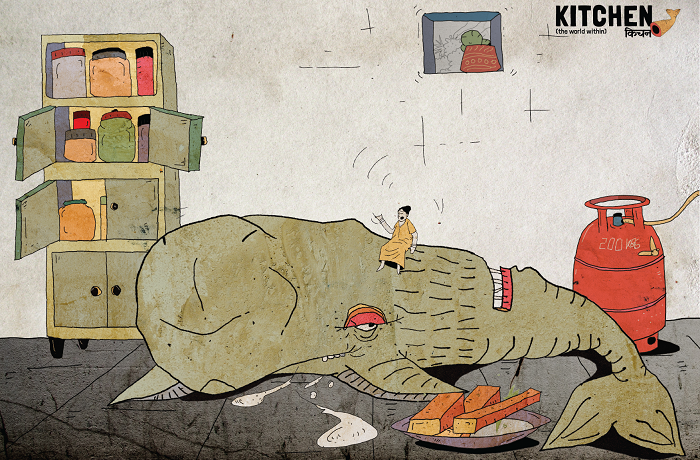Indian animation has been making noise for sometime now. And for all the right reasons! Gone are the days when animation as a medium was only meant for entertainment. Now, the medium is effectively used to raise voices that matter.
One such instance is Kitchen : The World Within, an animated short film by independent and acclaimed animation filmmaker Abhishek Verma, that goes live with crowdfunding today, 17 September. Presented by The Matchbox.Co and Climb Media, the film is slated for January 2020 release.

Kitchen is a 10 to 12 minute hand drawn animation film on the theme of domestication and social conditioning of women towards kitchen. The film tells the tale of Rama, an average Indian housewife who befriends a live 200-year-old, gigantic Sperm Whale, Mushi, brought by her husband and her father-in-law, to be cooked. Both of them develop a cordial bond and it inspires her to break away from the continuum of her cooking chores and explore the magical world that she yearns for.
The Sperm Whale stands as an analogy to the huge workload she or any woman shoulders in the process of taking care of the kitchen in her daily life. With the arrival of Mushi in her life, Rama gets a chance and encouragement to look beyond the four walls of the kitchen.

Commenting on the inspiration behind Kitchen, Verma mentioned, “I was inspired to create this animation short film as a consequence of my past research at the Young India Fellowship, on Kitchen and how it has led to the domestication and subjugation of women for centuries. Industrious women in rural and semi urban spaces alike spend 13.5 years of their active life cooking and taking care of the kitchen. They are even conditioned to consider the kitchen as their sole responsibility and world. If they choose not to serve, they are inflicted with guilt and accused of being irresponsible towards their families. These tasks and duties are most often fulfilled beyond expectations, but is seldom acknowledged, appreciated or compensated in any form. I hope the film raises awareness and introspection, drawing attention towards the women who conduct a thankless, selfless service towards their families.”
Creating such an impactful film in animation is not an easy task. A film can be created single-handedly but it is generally not considered to be the right manner to produce content.
Elaborating on the decision to go with crowdfunding on Wishberry for Kitchen, Verma added, “Right funding or backing has its own pros – all resources are skilled and of high quality, the scale and reach of the film can be multiplied and the market opens to certain kind of storytelling or genre or medium. In the entire course of making Kitchen, we are collaborating with multiple stakeholders for whom there should be a fair share of compensation. However, it is a shoe-string budget that we are working on, but the project is one which we can exceptionally relate to and I’m sure will connect with the masses. Thus to bring about a story that is an intrinsic part of every person’s life but often ignored, crowdfunding will help us translate this into reality and would enable us to compensate each of the departments in the film production get their fair share.”
Looking at the teaser and learning about Kitchen, I’m reminded of a campaign run by food delivery app, Zomato, in which one of their ads read – “Cooking should be a choice for her”. It left a lasting impression as cooking should be an option for anyone, irrespective of gender. Being a homemaker is an uphill task which often goes unnoticed and is undermined. The conditioning has been so strongly imbibed within the female psyche, that the incapability raises questions of self-worth. Thankfully, these mindsets are changing, and films like Kitchen are setting milestones for the same, which deserve our support.

